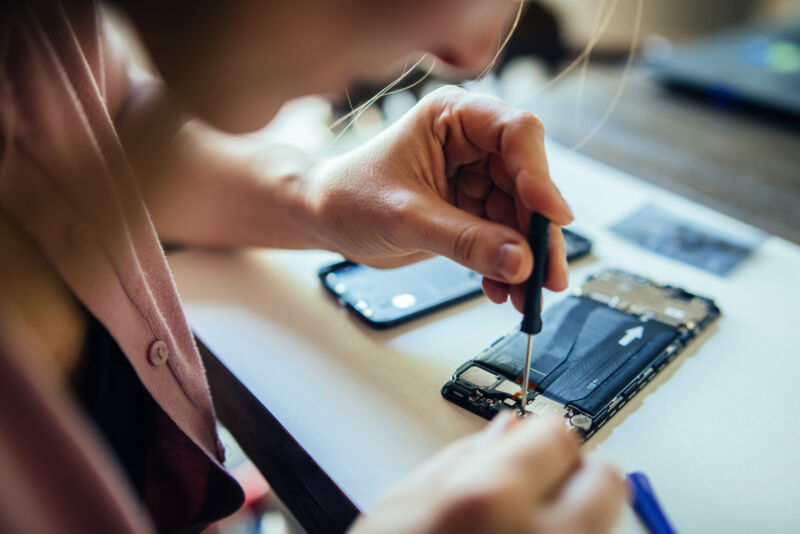
Makers of numerous product categories, including TVs, vacuums, smartphones, and tablets, could be required to enable repairs for their products for up to 10 years after purchase, depending on the device type. The European Commission on Wednesday announced a proposal it has adopted that would implement long-term repair requirements on electronics makers if the European Parliament and Council approve it.
The regulation would apply to any devices with repairability requirements in the EU, including vacuum cleaners, washer-dryers, welding equipment, servers, and data-storage devices. The EU is currently hammering out right-to-repair requirements for smartphones and tablets.
Already, the EU requires vendors to repair or replace products within two years of purchase for free if the product is defective. The new regulation would require companies to provide a free repair (instead of replacing the product) if doing so would be the same price or cheaper than replacing it.
Further, the proposed legislation requires vendors to perform repairs for a minimum of five to 10 years, depending on the device type, after purchase. TV makers, for example, would be required to do repairs for at least seven years after purchase, while washing machine and washer-dryer makers would be on the hook for 10 years. The EU is currently mulling proposals requiring smartphone and tablet makers to provide repairs for up to five years under the law proposed on Wednesday.
The regulation wouldn’t require vendors to perform repairs in this time frame if it is “impossible,” such as if the “repair is technically impossible,” the commission explained in a Q&A page.
Over 15 years, the commission estimates this regulation would save 18.5 million tons of greenhouse gas emissions, 1.8 million tons of resources, and 3 million tons of waste. Meanwhile, EU consumers would save 176.5 billion euro (about $192.3 billion), and “sellers and producers” would save about 15.6 billion euro (about $16.3 billion), by the commission’s measures.
Making repair more appealing
One of the drivers behind the proposal is boosting the repair sector, which the commission claimed would see job growth if this regulation passes. It didn’t provide a new job count estimate, however.
The commission’s announcement Wednesday said:
Over the last decades, replacement has often been prioritized over repair whenever products become defective, and insufficient incentives have been given to consumers to repair their goods when the legal guarantee expires. The proposal will make it easier and more cost-effective for consumers to repair as opposed to replace goods.
The proposal also seeks European Union member states to set up an “online matchmaking repair platform to connect consumers with repairers and sellers of refurbished goods in their area.” It also requires companies to be vocal and inform customers about its repair obligations and services, including providing repair prices and time estimates upon request.
The commission wants to establish a “European quality standard for repair services” to help consumers find “higher quality” repair shops. The standard would “be open to all repairers across the EU willing to commit to minimum quality standards, for example, based on duration or availability of products.”
Ongoing debate
The European Right to Repair coalition posted a statement Wednesday arguing that the commission’s proposal “does not tackle the cost of repair” or do enough to empower independent repair shops. It has pushed for legislation guaranteeing the use of third-party and secondhand spare parts and universal access to affordable spare parts, repair manuals, and diagnostic tools, as well as financial incentives to reduce pricing for repairs.
The coalition thinks vendors should be required to repair devices within two years of purchase, regardless of whether it’s cheaper than replacing the item for the vendor. It also wants the proposal to affect more product categories.
The commission has acknowledged that consumers are sometimes deterred by repair costs and says its proposal is partially about making repairs a more appealing option to consumers with broken gadgets. But instead of putting regulations on things like spare parts and pricing, it’s banking on hardware makers building more repairable designs, as per its Ecodesign Directive.
During a press conference yesterday reported on by TechCrunch, Didier Reynders, one of the commission’s justice commissioners, pointed to the importance of repairable designs for reducing repair costs.
“It means that it’s possible to really cut significantly the cost of repair. … Because often—in the sound sector for example, audio equipment, it is not possible to actually open up a device—you can’t actually get inside it yourself. So the Ecodesign approach should simplify things there.”
Despite commission claims that its proposal could help local repair shops, Cecilia Bonefeld-Dahl, director-general of DigitalEurope, a tech trade group, hinted at the industry’s early reluctance to relinquishing some control over the repairs of purchased gadgets.
https://arstechnica.com/?p=1926309

